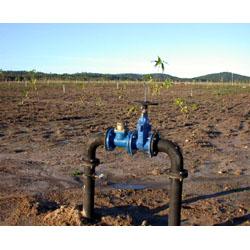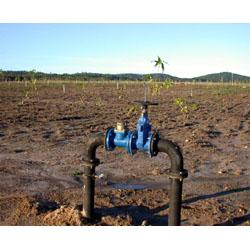Tapping into wastewater for timber production
Published on 14 November, 2002
In the midst of the biggest drought to plague Australia in many years, Central Queensland University is investigating the effects of irrigating mixed cropping systems with municipal wastewater.
CQU’s Dr Nanjappa Ashwath said the disposal of municipal wastewater into rivers could affect marine biodiversity and threaten the existence of coral reefs. “However, the same wastewater can be used as a ‘resource’ to enhance plant production, particularly in Central Queensland where water supply is scarce”.
 “Recycling through irrigation is most attractive due to easy adoptability, possible decentralised application and the potential of raising commercial crops.
“Recycling through irrigation is most attractive due to easy adoptability, possible decentralised application and the potential of raising commercial crops.
CQU has established a 1.6-hectare experimental site at Yeppoon, to determine the pros and cons of irrigating tree-bamboo-grass cropping systems with municipal wastewater. This project is being investigated by PhD scholar, Ajay Sharma, under the supervision of Dr Nanjappa Ashwath and Professor David Midmore. The Department of Natural Resources & Mines and Livingstone Shire Council’s Danny Toon support the project.
The experiment consists of seven cropping systems involving tree, bamboo and grass either planted alone or in mixed cultivation. These cropping systems are expected to produce roots at various depths, resulting in varied efficiency in nutrients and water uptake. The economic value of Pangola grass and its uses are well known, the Ma Bamboo is one of the giant bamboos of the world, known for its large size poles and edible shoots, and the flooded gum is renowned for its biomass production and water use.
“The experiment aims at identifying an environmentally-friendly and sustainable cropping system that is most efficient in taking up the effluent water and nutrients, while yielding commercial produce.
 Periodical measurements of plant growth; changes in soil nutrient status; microbial populations; plant water usage; as well as nutrient removal by the crops are being monitored. The changes in soil properties and hydrology are slow, and hence long-term monitoring is anticipated.
Periodical measurements of plant growth; changes in soil nutrient status; microbial populations; plant water usage; as well as nutrient removal by the crops are being monitored. The changes in soil properties and hydrology are slow, and hence long-term monitoring is anticipated.
“In Rockhampton area alone, more than 15,000 megalitres of wastewater is produced annually, providing enough water to irrigate up to 5000 hectares of timber plantation,” Dr Ashwath said.
He said by tapping into municipal wastewater, Central Queensland could be saving water and money, as well as protecting the environment.
The plantation trial will produce practical information for community groups and will demonstrate the pros and cons of using wastewater in timber production.

